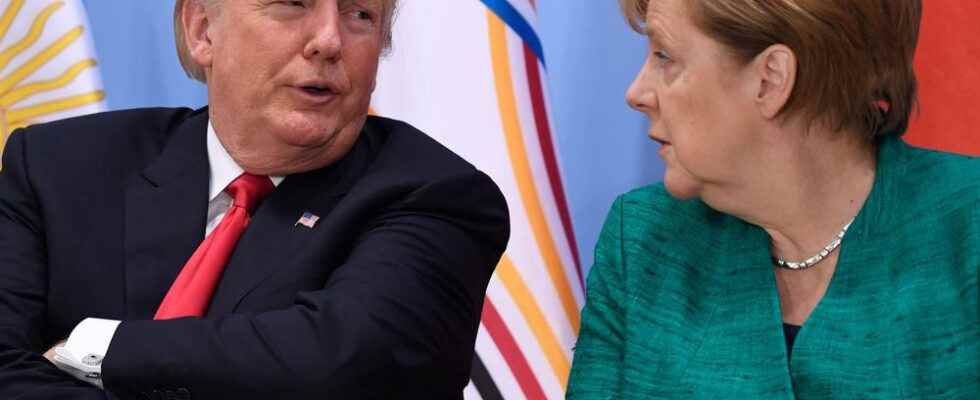An “unreliable partner”: this is how Germany has often been presented in the United States lately, its ambassador in Washington, Emily Haber, was alarmed in a confidential dispatch revealed at the end of January by the weekly. Der Spiegel. The diplomat even fears “tremendous” damage to the reputation, across the Atlantic, of her country, accused by some of “sleeping with Putin”. In question: the precautions deemed excessive by Berlin with its main gas supplier, Russia, while the latter threatens to invade Ukraine.
It is indeed difficult to speak of osmosis between Washington and Berlin in the Ukrainian crisis. While President Joe Biden multiplied his marks of firmness against the Kremlin, even reinforcing the American military presence in Eastern Europe, Olaf Scholz, a novice in geopolitics, showed great restraint. This dissonance will inevitably be discussed during his first visit, as Chancellor, to the White House on Monday. “Germany’s positioning irritates its partners, notes Claudia Major, research director at the German Institute for International Affairs and Security. There is an urgent need to pick up the pieces.”
Germany has, it is true, shown a certain delay in starting up: it was only in mid-January, after a few weeks of procrastination, that Olaf Scholz confirmed that the Russian-German gas pipeline Nord Stream 2 would be well affected by the sanctions aimed at the Kremlin, in the event of an attack. Several episodes then blurred this message. The head of the German navy called for “giving respect” to Vladimir Putin, describing the idea of a Russian invasion of Ukraine as “nonsense”. At the same time, Berlin refused to deliver weapons to Kiev, even blocking the sending to the Ukrainian forces of artillery batteries by Estonia.
Biden’s outstretched hand
Result: Germany finds itself under the fire of criticism from the Baltic countries, Poland and Ukraine, which castigate its lack of solidarity. Polish Prime Minister Mateusz Morawiecki has publicly expressed his “great disappointment” with Estonian guns. Washington, on the other hand, refrains from any open criticism, determined to maintain the most perfect unity. At least on the front. “But behind the scenes, we are getting annoyed, notes Benjamin Haddad, European director of the Atlantic Council. Even in the Democratic ranks, we are starting to think that there is a problem with Berlin.
In fact, the US-German relationship has been on alternating current for ten years. “Barack Obama had a very good personal relationship with Angela Merkel and the desire to give her the keys to Europe, when he launched his “Asian pivot” project. [qui consistait à recentrer la diplomatie américaine en Asie-pacifique, ndlr], recalls Benjamin Haddad. Then we moved on to a phase of very harsh confrontation with Donald Trump, obsessed with the trade balance favorable to Germany, which he made the symbol of an international system that harmed American interests. shake hands in front of the cameras in 2017 and had constantly criticized its policy of welcoming Syrian refugees.
US President Donald Trump and German Chancellor Angela Merkel at the G20 on July 8, 2017 in Hamburg.
afp.com/SAUL LOEB
As soon as he arrived at the White House, Joe Biden extended a hand to Berlin. But without noticing reciprocity… Germany fears paying the high price of an escalation with Russia, which represents 55% of its gas imports. “The Biden administration has underestimated the fact that the Germans are not close to American positions on Russia and even China, as the European investment agreement showed [signé le 30 décembre 2020], worn by Angela Merkel, specifies Benjamin Haddad. Added to this is a hesitant leadership from the Chancellor and, now, her successor.”
So far, Olaf Scholz has alternated between radio silences and stereotyped responses on the Ukrainian crisis, contenting himself with repeating that any attack by Russia will have a “high cost”. “He does not take hold of the question enough, it cannot last given the importance of the crisis, believes Constanze Stelzenmüller, of the Brooking Institution. He will have to show that he has taken the measure of the strategic issue of this crisis, while Moscow is carrying out unprecedented maneuvers since 1945, by moving troops from Siberia to its western border. The trip to Washington, before a meeting with Vladimir Putin in Moscow on February 15, is therefore a first test on the international scene.
Berlin plans to supply itself with American gas
How can the Chancellor restore his image in the eyes of Washington? “Failing to deliver arms to Ukraine, Germany, in order to be perceived again as a reliable ally, can deploy additional troops in the Baltic countries within the framework of NATO, offers Claudia Major. She can also commit to increasing its defense budget to get closer to the objective of a minimum of 2% of GDP devoted to military spending, as Berlin has promised NATO since 2014. It can also pause Nord Stream 2 as long as the Russians will not have reduced the number of troops on the Ukrainian border.”
Already, Berlin is seeking to diversify its gas supplies to reduce its dependence on Russia. The chancellery confirmed on Wednesday that the country would accelerate the construction of its first liquefied natural gas terminals, from Qatar or… the United States. “In this crisis, ultimately, the Germans will be at the rendezvous of the transatlantic alliance, as in Yugoslavia in the 1990s, then in Afghanistan after September 11”, wants to believe Constanze Stelzenmüller. Enough to make the diplomatic dispatches of the ambassador to Washington less alarmist.
